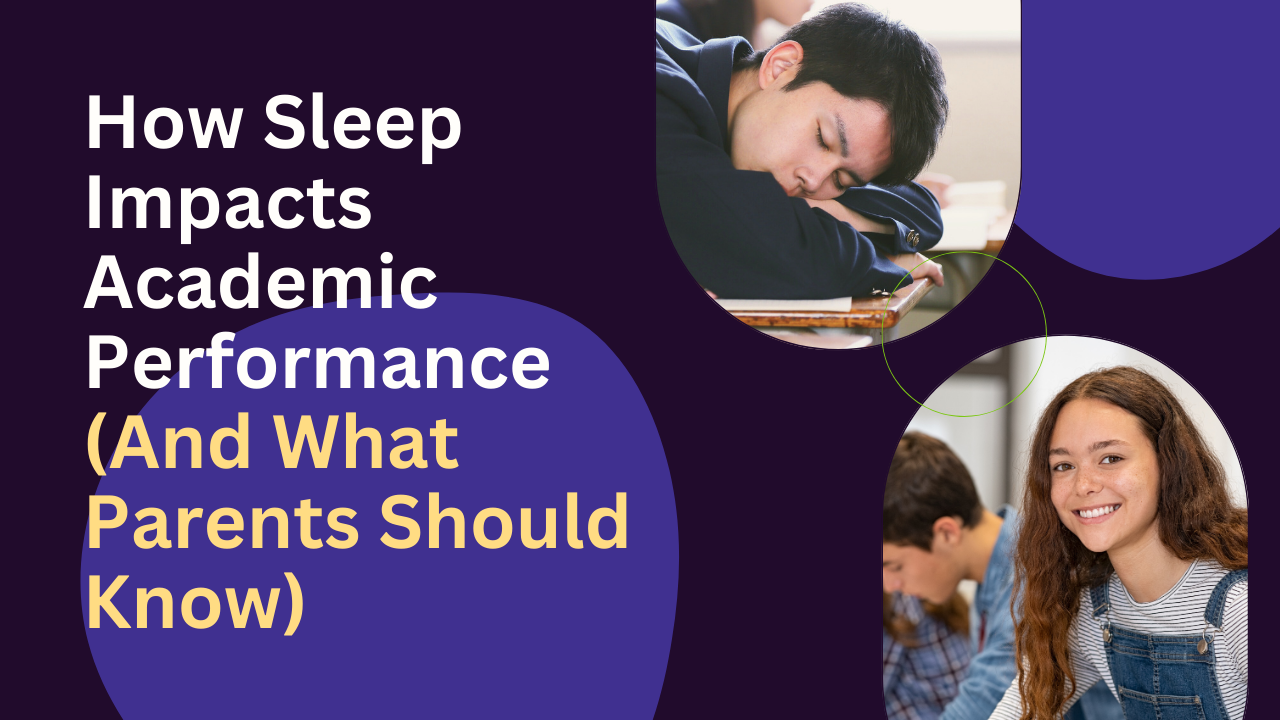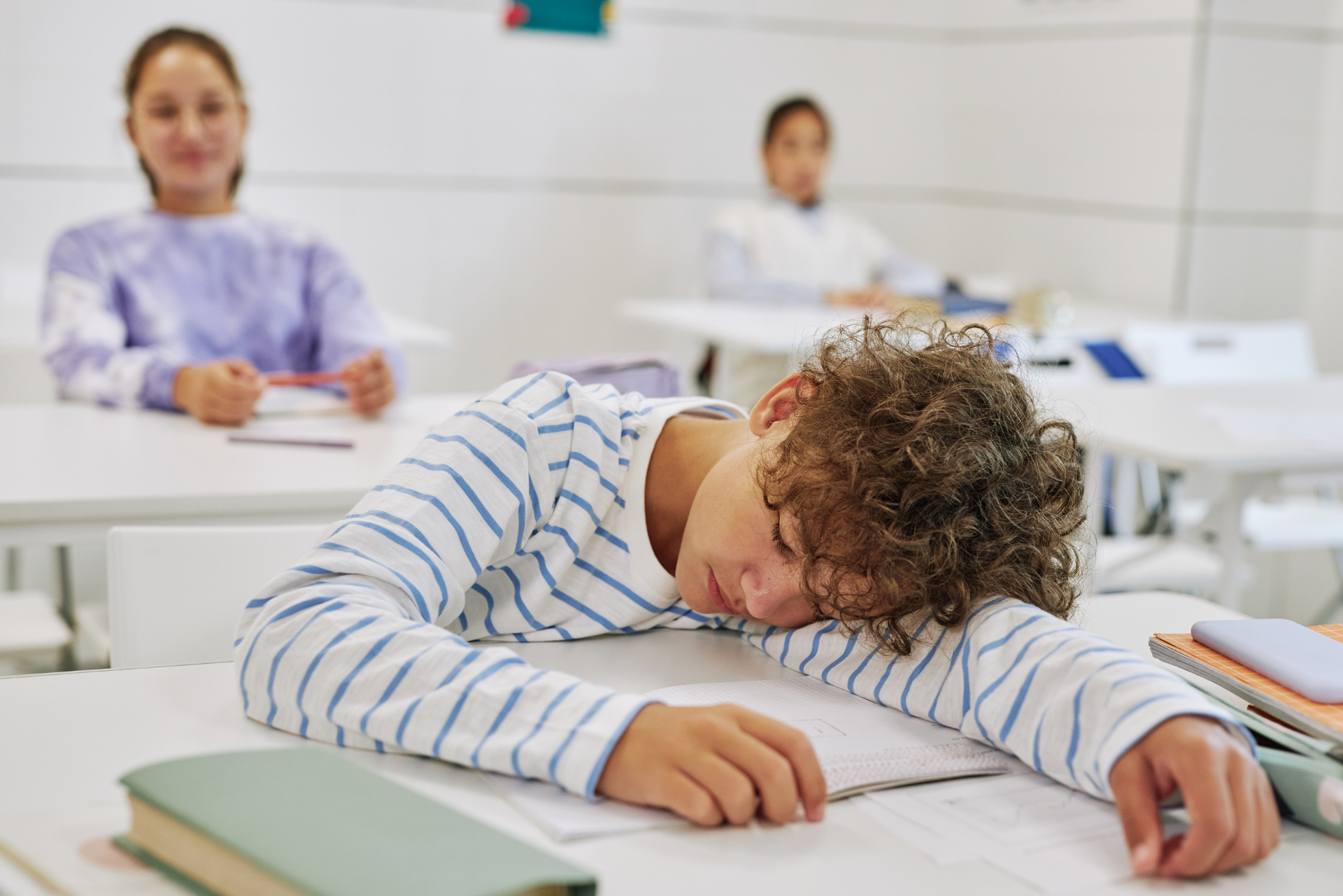

Last Updated on April 25, 2025
From late-night study sessions to early morning classes, students today are often caught in a cycle that deprives them of one of the most vital tools for success: sleep. The relationship between a good night’s sleep and academic performance has been the subject of countless studies, and the results are clear—poor sleep quality can have a profound impact on a student’s ability to perform, particularly in math, which demands sharp cognitive and problem-solving skills.
In this blog, we’ll explore how sleep patterns, sleep habits, and overall sleep health affect students’ academic achievement, and what parents can do to help children develop healthy sleep habits to boost academic success.
Sleep plays a crucial role in cognitive function, memory consolidation, and learning, making it an essential factor in academic performance. Research has consistently shown that sleep quality and duration are significantly related to academic achievement. Poor sleep quality and inadequate sleep duration can lead to decreased academic performance, affecting students’ ability to concentrate, retain information, and solve problems.
College students, in particular, are vulnerable to sleep disorders and poor sleep habits due to their demanding academic schedules, social activities, and emotional stress. The relationship between sleep and academic performance is well-documented, with studies highlighting that poor sleep can lead to lower grades and diminished academic success. Sleep-dependent memory consolidation is critical for subjects like math, which require long-term memory and logical thinking.
Understanding the importance of sleep and its impact on academic performance is the first step toward achieving academic success. By prioritizing sleep and developing healthy sleep habits, students can improve their cognitive function, enhance memory consolidation, and ultimately achieve better academic outcomes.
Sleep is not just rest; it’s when the brain actively processes, organizes, and stores new information. This process, known as sleep-dependent memory consolidation, is critical for subjects like math that require long-term memory and logical thinking.
When students experience inadequate sleep, they’re more likely to suffer from mental health problems, daytime sleepiness, and lower grade point averages (GPAs). These issues are not limited to high school students—college students, medical students, and university students all show similar patterns, according to a systematic review published in Sleep Med Rev.

Math performance relies heavily on the brain’s ability to recall and apply formulas, recognize patterns, and think critically. Sleep deprivation impairs cognitive processes such as attention, problem-solving, and memory—all essential for success in math.
One cross-sectional study found a statistically significant positive correlation between good quality sleep and academic achievement, particularly in analytical and technical subjects like math and science.
Sleep isn’t just about brain function; it also influences physical health and mental health. Students who experience sleep problems or insomnia symptoms are more likely to develop mental health issues like anxiety and depression. These, in turn, contribute to poor academic performance.
In contrast, students who prioritize a good night’s sleep often show better emotional regulation, higher energy levels, and improved focus—factors that contribute to better academic performance in demanding subjects.
Several factors can affect sleep quality and duration, including physical and mental health, sleep patterns, and sleep habits. Sleep disorders, such as obstructive sleep apnea, can significantly impact sleep quality, leading to poor academic performance. Inadequate sleep duration, poor sleep quality, and irregular sleep schedules can all contribute to sleep deprivation, which negatively impacts cognitive function, memory consolidation, and learning.
Mental health issues, such as anxiety and depression, can also affect sleep quality, creating a vicious cycle of poor sleep and poor mental health. Understanding these factors is crucial in developing strategies to improve sleep quality and duration, ultimately leading to better academic performance.

In the context of university students, previous studies have shown that sleep quality is a significant predictor of academic performance. For instance, a study published in the journal Sleep found that university students who reported better sleep quality had higher grade point averages (GPAs) and better academic achievement. Another study published in the Journal of Adolescent Health found that adolescents with earlier average bedtimes and wake-up times had better sleep quality and academic performance. These findings highlight the importance of prioritizing sleep and developing healthy sleep habits to achieve academic success.
Moreover, research has shown that sleep-dependent memory consolidation is critical for learning and memory, and that sleep deprivation can lead to significant impairments in cognitive function. A study published in the journal Sleep Medicine Reviews found that sleep deprivation can lead to significant decreases in attention, memory, and decision-making abilities, all of which are critical for academic performance. Therefore, it is essential for university students to prioritize sleep and develop healthy sleep habits to achieve academic success.
Sleep is a critical factor in academic performance, and understanding the factors that affect sleep quality and duration is essential in developing strategies to improve sleep and ultimately achieve academic success. By prioritizing sleep and developing healthy sleep habits, university students can improve their academic performance, reduce their risk of mental health problems, and achieve their full potential.
The number of hours of sleep a student gets matters greatly. According to experts, adolescents and young adults need 8–10 hours of adequate sleep per night. However, average sleep quality and sleep duration among students are declining due to lifestyle factors like technology use and academic pressure.
Poor sleep and sleep deficit lead to slower reaction times and reduced mental flexibility—two abilities vital for solving complex math problems.
Conditions such as obstructive sleep apnea, insomnia, and delayed sleep phase syndrome are common sleep disorders among adolescents. These interfere with sleep quality scores and disrupt the sleep cycle, often leading to poor grades and academic performance among students.
Parents should watch for warning signs like loud snoring, excessive daytime fatigue, or an inability to fall asleep. In some cases, a sleep specialist may be necessary.
There is a significant positive correlation between good sleep quality and students’ academic performance. One study reported that university students’ academic performance was noticeably lower when their sleep schedule was inconsistent or their sleep routines were frequently disrupted.
A consistent sleep schedule, especially with an earlier average bedtime, helps regulate the body’s internal clock and improve cognitive performance during the school day.
Take, for example, a group of medical students enrolled in a demanding solid state chemistry class. A previous study found that medical students with better sleep habits had higher GPAs. These students were evaluated based on their sleep habits, wake-up time, and GPA. The data analysis revealed a significant correlation between students who maintained regular sleep schedules and those with higher grades.
Similarly, university students who reported better sleep quality performed better on math assessments and were less likely to receive poor grades.
You might be wondering: how much sleep does your child need to do well in school?
The American Academy of Sleep Medicine recommends the following:
Achieving these benchmarks can significantly boost students’ academic achievement and improve their mental health and resilience.
Improving your child’s sleep habits doesn’t have to be complicated. Here are practical steps you can take:
Set regular bedtimes and wake up times, even on weekends. A regular sleep schedule helps regulate melatonin production, making it easier for kids to fall asleep and wake up refreshed.
Devices emit blue light that suppresses melatonin and disrupts sleep quality. Limit screen time at least one hour before bed.

Make sure your child’s bedroom is dark, quiet, and cool. White noise machines and blackout curtains can help improve sleep quality.
If your child snores, wakes up frequently, or seems excessively tired during the day, consider a consultation for a sleep disorder like obstructive sleep apnea.
Children are more likely to adopt better sleep habits if they see their parents also valuing good quality sleep.
It’s not just parents—schools also play a role in addressing adolescent sleep and improving school performance. Sleep loss leads to significant learning and memory impairments, decreased attention, and reduced vigilance, particularly among college students. Some actionable changes include:
Sleep studies involving children and university students must be approved by a research ethics committee, especially when data collection includes health information or interventions. Access to the data supporting these findings can be obtained from the corresponding author upon reasonable request.
While this blog summarizes findings from previous studies, many include competing interests or rely on other third party material, so parents should always consult with healthcare professionals for personalized advice.
The relationship between sleep and math performance is not just theory—it’s backed by solid evidence. Students who get enough sleep enjoy not only improved academic performance, but also better mental health, emotional regulation, and overall well-being.
As parents, one of the most impactful steps you can take is helping your child build a foundation of healthy sleep habits. Whether it’s encouraging an earlier bedtime, limiting screens, or recognizing the signs of sleep disorders, your guidance can make all the difference.
Because in the race for academic success, sometimes the best thing your child can do… is sleep.
Key Takeaway: A consistent sleep schedule, adequate sleep duration, and good sleep quality can significantly enhance your child’s math performance. Support their journey by helping them build strong, science-backed sleep routines—starting tonight.


